Giorgetta, Nicoletti & Adema
A Conversation on Digital Archiving Practices
2015
# A Conversation on Digital Archiving Practices
A couple of months ago Davide Giorgetta and Valerio Nicoletti (both ISIA
Urbino) did an interview with me for their MA in Design of Publishing. Silvio
Lorusso, was so kind to publish the interview on the fantastic
[p-dpa.net](http://p-dpa.net/a-conversation-on-digital-archiving-practices-
with-janneke-adema/). I am reblogging it here.
* * *
[Davide Giorgetta](http://p-dpa.net/creator/davide-giorgetta/) and [Valerio
Nicoletti](http://p-dpa.net/creator/valerio-nicoletti/) are both students from
[ISIA Urbino](http://www.isiaurbino.net/home/), where they attend the Master
Course in Design for Publishing. They are currently investigating the
independent side of digital archiving practices within the scope of the
publishing world.
As part of their research, they asked some questions to Janneke Adema, who is
Research Fellow in Digital Media at Coventry University, with a PhD in Media
(Coventry University) and a background in History (MA) and Philosophy (MA)
(both University of Groningen) and Book and Digital Media Studies (MA) (Leiden
University). Janneke’s PhD thesis focuses on the future of the scholarly book
in the humanities. She has been conducting research for the
[OAPEN](http://project.oapen.org/index.php/about-oapen) project, and
subsequently the OAPEN foundation, from 2008 until 2013 (including research
for OAPEN-NL and DOAB). Her research for OAPEN focused on user needs and
publishing models concerning Open Access books in the Humanities and Social
Sciences.
**Davide Giorgetta & Valerio Nicoletti: Does a way out from the debate between
publishers and digital independent libraries (Monoskop Log, Ubuweb,
Aaaarg.org) exist, in terms of copyright? An alternative solution able to
solve the issue and to provide equal opportunities to everyone? Would the fear
of publishers of a possible reduction of incomes be legitimized if the access
to their digital publications was open and free?**
Janneke Adema: This is an interesting question, since for many academics this
‘way out’ (at least in so far it concerns scholarly publications) has been
envisioned in or through the open access movement and the use of Creative
Commons licenses. However, the open access movement, a rather plural and
loosely defined group of people, institutions and networks, in its more
moderate instantiations tends to distance itself from piracy and copyright
infringement or copy(far)left practices. Through its use of and favoring of
Creative Commons licenses one could even argue that it has been mainly
concerned with a reform of copyright rather than a radical critique of and
rethinking of the common and the right to copy (Cramer 2013, Hall
2014).1(http://p-dpa.net/a-conversation-on-digital-archiving-practices-
with-janneke-adema/#fn:1 "see footnote") Nonetheless, in its more radical
guises open access can be more closely aligned with the practices associated
with digital pirate libraries such as the ones listed above, for instance
through Aaron Swartz’s notion of [Guerilla Open
Access](https://archive.org/stream/GuerillaOpenAccessManifesto/Goamjuly2008_djvu.txt):
> We need to take information, wherever it is stored, make our copies and
share them with the world. We need to take stuff that’s out of copyright and
add it to the archive. We need to buy secret databases and put them on the
Web. We need to download scientific journals and upload them to file sharing
networks. We need to fight for Guerilla Open Access. (Swartz 2008)
However whatever form or vision of open access you prefer, I do not think it
is a ‘solution’ to any problem—such as copyright/fight—, but I would rather
see it, as I have written
[elsewhere](http://blogs.lse.ac.uk/impactofsocialsciences/2014/11/18
/embracing-messiness-adema-pdsc14/), ‘as an ongoing processual and critical
engagement with changes in the publishing system, in our scholarly
communication practices and in our media and technologies of communication.’
And in this sense open access practices offer us the possibility to critically
reflect upon the politics of knowledge production, including copyright and
piracy, openness and the commons, indeed, even upon the nature of the book
itself.
With respect to the second part of your question, again, where it concerns
scholarly books, [research by Ronald
Snijder](https://scholar.google.com/citations?view_op=view_citation&hl=en&user=PuDczakAAAAJ&citation_for_view=PuDczakAAAAJ:u-x6o8ySG0sC)
shows no decline in sales or income for publishers once they release their
scholarly books in open access. The open availability does however lead to
more discovery and online consultation, meaning that it actually might lead to
more ‘impact’ for scholarly books (Snijder 2010).
**DG, VN: In which way, if any, are digital archiving practices stimulating
new publishing phenomenons? Are there any innovative outcomes, apart the
obvious relation to p.o.d. tools? (or interesting new projects in this
field)**
JA: Beyond extending access, I am mostly interested in how digital archiving
practices have the potential to stimulate the following practices or phenomena
(which in no way are specific to digital archiving or publishing practices, as
they have always been a potential part of print publications too): reuse and
remix; processual research and iterative publishing; and collaborative forms
of knowledge production. These practices interest me mainly as they have the
potential to critique the way the (printed) book has been commodified and
essentialised over the centuries, in a bound, linear and fixed format, a
practice which is currently being replicated in a digital context. Indeed, the
book has been fixed in this way both discursively and through a system of
material production within publishing and academia—which includes our
institutions and practices of scholarly communication—that prefers book
objects as quantifiable and auditable performance indicators and as marketable
commodities and objects of symbolic value exchange. The practices and
phenomena mentioned above, i.e. remix, versioning and collaboration, have the
potential to help us to reimagine the bound nature of the book and to explore
both a spatial and temporal critique of the book as a fixed object; they can
aid us to examine and experiment with various different incisions that can be
made in our scholarship as part of the informal and formal publishing and
communication of our research that goes beyond the final research commodity.
In this sense I am interested in how these specific digital archiving,
research and publishing practices offer us the possibility to imagine a
different, perhaps more ethical humanities, a humanities that is processual,
contingent, unbound and unfinished. How can these practices aid us in how to
cut well in the ongoing unfolding of our research, how can they help us
explore how to make potentially better interventions? How can we take
responsibility as scholars for our entangled becoming with our research and
publications? (Barad 2007, Kember and Zylinska 2012)
Examples that I find interesting in the realm of the humanities in this
respect include projects that experiment with such a critique of our fixed,
print-based practices and institutions in an affirmative way: for example Mark
Amerika’s [remixthebook](http://www.remixthebook.com/) project; Open
Humanities’ [Living Books about Life](http://www.livingbooksaboutlife.org/)
series; projects such as
[Vectors](http://vectors.usc.edu/issues/index.php?issue=7) and
[Scalar](http://scalar.usc.edu/); and collaborative knowledge production,
archiving and creation projects, from wiki-based research projects to AAAARG.
**DG, VN: In which way does a digital container influence its content? Does
the same book — if archived on different platforms, such as _Internet Archive_
, _The Pirate Bay_ , _Monoskop Log_ — still remain the same cultural item?**
JA: In short my answer to this question would be ‘no’. Books are embodied
entities, which are materially established through their specific affordances
in relationship to their production, dissemination, reception and
preservation. This means that the specific materiality of the (digital) book
is partly an outcome of these ongoing processes. Katherine Hayles has argued
in this respect that materiality is an emergent property:
> In this view of materiality, it is not merely an inert collection of
physical properties but a dynamic quality that emerges from the interplay
between the text as a physical artifact, its conceptual content, and the
interpretive activities of readers and writers. Materiality thus cannot be
specified in advance; rather, it occupies a borderland— or better, performs as
connective tissue—joining the physical and mental, the artifact and the user.
(2004: 72)
Similarly, Matthew Kirschenbaum points out that the preservation of digital
objects is:
> _logically inseparable_ from the act of their creation’ (…) ‘The lag between
creation and preservation collapses completely, since a digital object may
only ever be said to be preserved _if_ it is accessible, and each individual
access creates the object anew. One can, in a very literal sense, _never_
access the “same” electronic file twice, since each and every access
constitutes a distinct instance of the file that will be addressed and stored
in a unique location in computer memory. (Kirschenbaum 2013)
Every time we access a digital object, we thus duplicate it, we copy it and we
instantiate it. And this is exactly why, in our strategies of conservation,
every time we access a file we also (re)create these objects anew over and
over again. The agency of the archive, of the software and hardware, are also
apparent here, where archives are themselves ‘active ‘‘archaeologists’’ of
knowledge’ (Ernst 2011: 239) and, as Kirschenbaum puts it, ‘the archive writes
itself’ (2013).
In this sense a book can be seen as an apparatus, consisting of an
entanglement of relationships between, among other things, authors, books, the
outside world, readers, the material production and political economy of book
publishing, its preservation and material instantiations, and the discursive
formation of scholarship. Books as apparatuses are thus reality shaping, they
are performative. This relates to Johanna Drucker’s notion of ‘performative
materiality’, where Drucker argues for an extension of what a book _is_ (i.e.
from a focus on its specific properties and affordances), to what a book
_does_ : ‘Performative materiality suggests that what something _is_ has to be
understood in terms of what it _does_ , how it works within machinic,
systemic, and cultural domains.’ For, as Drucker argues, ‘no matter how
detailed a description of material substrates or systems we have, their use is
performative whether this is a reading by an individual, the processing of
code, the transmission of signals through a system, the viewing of a film,
performance of a play, or a musical work and so on. Material conditions
provide an inscriptional base, a score, a point of departure, a provocation,
from which a work is produced as an event’ (Drucker 2013).
So, to come back to your question, these specific digital platforms (Monoskop,
The Pirate Bay etc.) become integral aspects of the apparatus of the book and
each in their own different way participates in the performance and
instantiation of the books in their archives. Not only does a digital book
therefore differ as a material or cultural object from a printed book, a
digital object also has materially distinct properties related to the platform
on which it is made available. Indeed, building further on the theories
described above, a book is a different object every time it is instantiated or
read, be it by a human or machinic entity; they become part of the apparatus
of the book, a performative apparatus. Therefore, as Silvio Lorusso has
stated:
**DG, VN: In your opinion, can scholarly publishing, in particular self-
archiving practices, constitute a bridge covering the gap between authors and
users in terms of access to knowledge? Could we hope that these practices will
find a broader use, moving from very specific fields (academic papers) to book
publishing in general?**
JA: On the one hand, yes. Self-archiving, or the ‘green road’ to open access,
offers a way for academics to make their research available in a preprint form
via open access repositories in a relatively simple and straightforward way,
making it easily accessible to other academics and more general audiences.
However, it can be argued that as a strategy, the green road doesn’t seem to
be very subversive, where it doesn’t actively rethink, re-imagine, or
experiment with the system of scholarly knowledge production in a more
substantial way, including peer-review and the print-based publication forms
this system continues to promote. With its emphasis on achieving universal,
free, online access to research, a rigorous critical exploration of the form
of the book itself doesn’t seem to be a main priority of green open access
activists. Stevan Harnad, one of the main proponents of green open access and
self-archiving has for instance stated that ‘it’s time to stop letting the
best get in the way of the better: Let’s forget about Libre and Gold OA until
we have managed to mandate Green Gratis OA universally’ (Harnad 2012). This is
where the self-archiving strategy in its current implementation falls short I
think with respect to the ‘breaking-down’ of barriers between authors and
users, where it isn’t necessarily committed to following a libre open access
strategy, which, one could argue, would be more open to adopting and promoting
forms of open access that are designed to make material available for others
to (re) use, copy, reproduce, distribute, transmit, translate, modify, remix
and build upon? Surely this would be a more substantial strategy to bridge the
gap between authors and users with respect to the production, dissemination
and consumption of knowledge?
With respect to the second part of your question, could these practices find a
broader use? I am not sure, mainly because of the specific characteristics of
academia and scholarly publishing, where scholars are directly employed and
paid by their institutions for the research work they do. Hence, self-
archiving this work would not directly lead to any or much loss of income for
academics. In other fields, such as literary publishing for example, this
issue of remuneration can become quite urgent however, even though many [free
culture](https://en.wikipedia.org/wiki/Free_culture_movement) activists (such
as Lawrence Lessig and Cory Doctorow) have argued that freely sharing cultural
goods online, or even self-publishing, doesn’t necessarily need to lead to any
loss of income for cultural producers. So in this respect I don’t think we can
lift something like open access self-archiving out of its specific context and
apply it to other contexts all that easily, although we should certainly
experiment with this of course in different domains of digital culture.
**DG, VN: After your answers, we would also receive suggestions from you. Do
you notice any unresolved or raising questions in the contemporary context of
digital archiving practices and their relation to the publishing realm?**
JA: So many :). Just to name a few: the politics of search and filtering
related to information overload; the ethics and politics of publishing in
relationship to when, where, how and why we decide to publish our research,
for what reasons and with what underlying motivations; the continued text- and
object-based focus of our archiving and publishing practices and platforms,
where there is a lack of space to publish and develop more multimodal,
iterative, diagrammatic and speculative forms of scholarship; issues of free
labor and the problem or remuneration of intellectual labor in sharing
economies etc.
**Bibliography**
* Adema, J. (2014) ‘Embracing Messiness’. [17 November 2014] available from [17 November 2014]
* Adema, J. and Hall, G. (2013) ‘The Political Nature of the Book: On Artists’ Books and Radical Open Access’. _New Formations_ 78 (1), 138–156
* Barad, K. (2007) _Meeting the Universe Halfway: Quantum Physics and the Entanglement of Matter and Meaning_. Duke University Press
* Cramer, F. (2013) _Anti-Media: Ephemera on Speculative Arts_. Rotterdam : New York, NY: nai010 publishers
* Drucker, J. (2013) _Performative Materiality and Theoretical Approaches to Interface_. [online] 7 (1). available from [4 April 2014]
* Ernst, W. (2011) ‘Media Archaeography: Method and Machine versus History and Narrative of Media’. in _Media Archaeology: Approaches, Applications, and Implications_. ed. by Huhtamo, E. and Parikka, J. University of California Press
* Hall, G. (2014) ‘Copyfight’. in _Critical Keywords for the Digital Humanities_ , [online] Lueneburg: Centre for Digital Cultures (CDC). available from [5 December 2014]
* Harnad, S. (2012) ‘Open Access: Gratis and Libre’. [3 May 2012] available from [4 March 2014]
* Hayles, N.K. (2004) ‘Print Is Flat, Code Is Deep: The Importance of Media-Specific Analysis’. _Poetics Today_ 25 (1), 67–90
* Kember, S. and Zylinska, J. (2012) _Life After New Media: Mediation as a Vital Process_. MIT Press
* Kirschenbaum, M. (2013) ‘The .txtual Condition: Digital Humanities, Born-Digital Archives, and the Future Literary’. _DHQ: Digital Humanities Quarterly_ [online] 7 (1). available from [20 July 2014]
* Lorusso, S. (2014) _The Post-Digital Publishing Archive: An Inventory of Speculative Strategies_. in ‘The Aesthetics of the Humanities: Towards a Poetic Knowledge Production’ [online] held 11 June 2014 at Coventry University. available from [31 May 2015]
* Snijder, R. (2010) ‘The Profits of Free Books: An Experiment to Measure the Impact of Open Access Publishing’. _Learned Publishing_ 23 (4), 293–301
* Swartz, A. (2008) _Guerilla Open Access Manifesto_ [online] available from [31 May 2015]
Barok
Shadow Libraries
2018
_A talk given at the [Shadow Libraries](http://www.sgt.gr/eng/SPG2096/)
symposium held at the National Museum of Contemporary Art (EMST) in
[Athens](/Athens "Athens"), 17 March 2018. Moderated by [Kenneth
Goldsmith](/Kenneth_Goldsmith "Kenneth Goldsmith") (UbuWeb) and bringing
together [Dusan Barok](/Dusan_Barok "Dusan Barok") (Monoskop), [Marcell
Mars](/Marcell_Mars "Marcell Mars") (Public Library), [Peter
Sunde](/Peter_Sunde "Peter Sunde") (The Pirate Bay), [Vicki
Bennett](/Vicki_Bennett "Vicki Bennett") (People Like Us), [Cornelia
Sollfrank](/Cornelia_Sollfrank "Cornelia Sollfrank") (Giving What You Don't
Have), and Prodromos Tsiavos, the event was part of the _[Shadow Libraries:
UbuWeb in Athens](http://www.sgt.gr/eng/SPG2018/) _programme organised by [Ilan
Manouach](/Ilan_Manouach "Ilan Manouach"), Kenneth Goldsmith and the Onassis
Foundation._
This is the first time that I was asked to talk about Monoskop as a _shadow
library_.
What are shadow libraries?
[Lawrence Liang](/Lawrence_Liang "Lawrence Liang") wrote a think piece for _e-
flux_ a couple of years ago,
in response to the closure of Library.nu, a digital library that had operated
from 2004, first as Ebooksclub, later as Gigapedia.
He wrote that:
[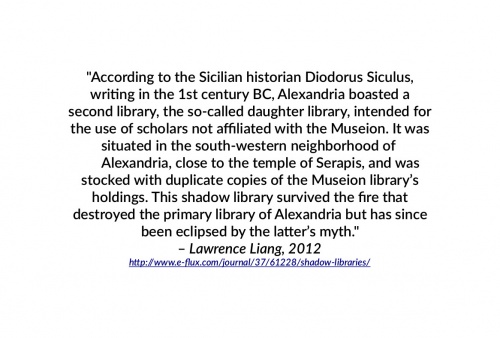](http://www.e-flux.com/journal/37/61228
/shadow-libraries/)
In the essay, he moves between identifying Library.nu as digital Alexandria
and as its shadow.
In this account, even large libraries exist in the shadows cast by their
monumental precedessors.
There’s a lineage, there’s a tradition.
Almost everyone and every institution has a library, small or large.
They’re not necessarily Alexandrias, but they strive to stay relevant.
Take the University of Amsterdam where I now work.
University libraries are large, but they’re hardly _large enough_.
The publishing market is so huge that you simply can’t keep up with all the
niche little disciplines.
So either you have to wait days or weeks for a missing book to be ordered
somewhere.
Or you have some EBSCO ebooks.
And most of the time if you’re searching for a book title in the catalogue,
all you get are its reviews in various journals the library subscribes to.
So my colleagues keep asking me.
Dušan, where do I find this or that book?
You need to scan through dozens of texts, check one page in that book, table
of contents of another book, read what that paper is about.
[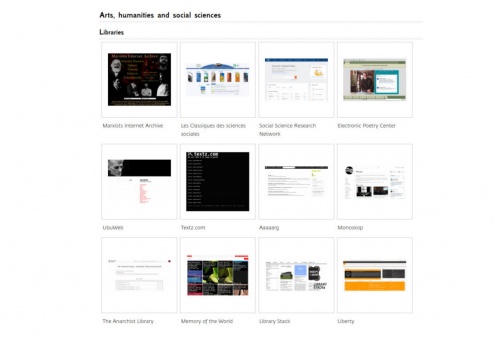](/Digital_libraries#Libraries
"Digital libraries#Libraries")
Or scrapes it from somewhere, since most books today are born digital and live
their digital lives.
...
Digital libraries need to be creative.
They don’t just preserve and circulate books.
[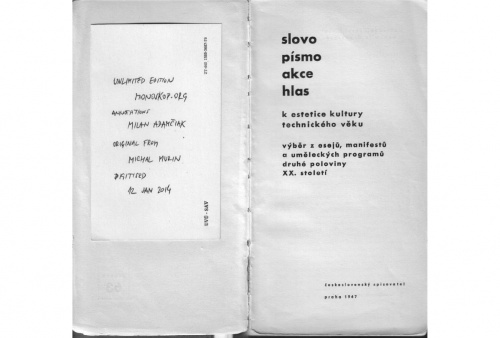](https://monoskop.org/log/?p=10262)
They engage in extending print runs, making new editions, readily
reproducible, unlimited editions.
[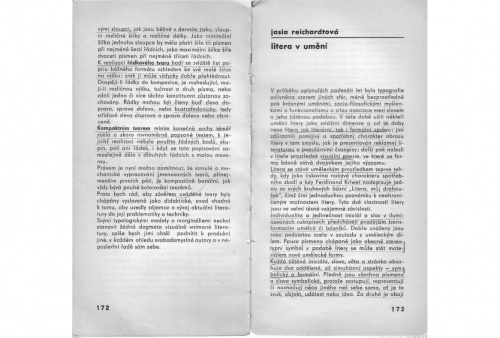](https://monoskop.org/images/d/de/Hirsal_Josef_Groegerova_Bohumila_eds_Slovo_pismo_akce_hlas.pdf#page=87)
This one comes with something extra. Isn’t this beautiful? You can read along
someone else.
In this case we know these annotations come from the Slovak avant-garde visual
poet and composer [Milan Adamciak](/Milan_Adamciak "Milan Adamciak").
[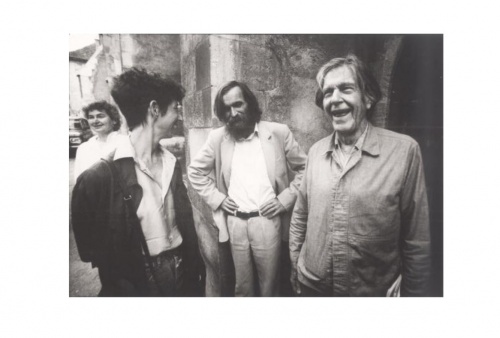](/Milan_Adamciak
"Milan Adamciak")
...standing in the middle.
A couple of pages later...
[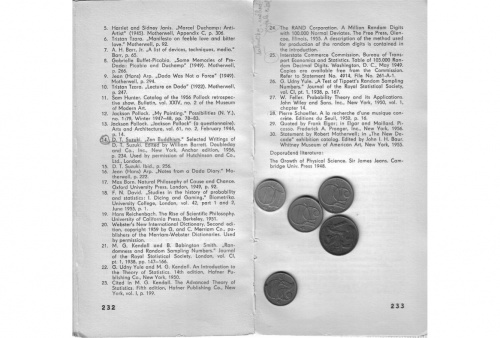](https://monoskop.org/images/d/de/Hirsal_Josef_Groegerova_Bohumila_eds_Slovo_pismo_akce_hlas.pdf#page=117)
...you can clearly see how he found out about a book containing one million
random digits [see note 24 on the image]. The strangest book.
[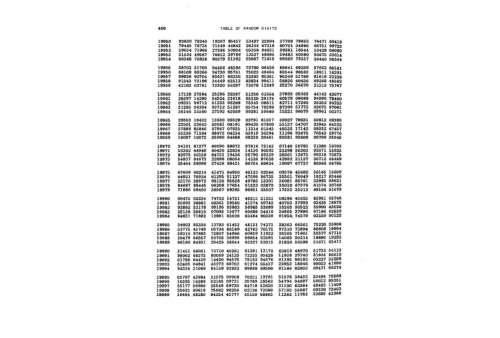](https://monoskop.org/log/?p=5780)
He was still alive when we put it up on Monoskop, and could experience it.
...
Digital libraries may seem like virtual, grey places, nonplaces.
But these little chance encounters happen all the time there.
There are touches. There are traces. There are many hands involved, visible
hands.
They join writers’ hands and help creating new, unlimited editions.
They may be off Google, but for many, especially younger generation these are
the places to go to learn, to share.
Rather than in a shadow, they are out in the open, in plain sight.
[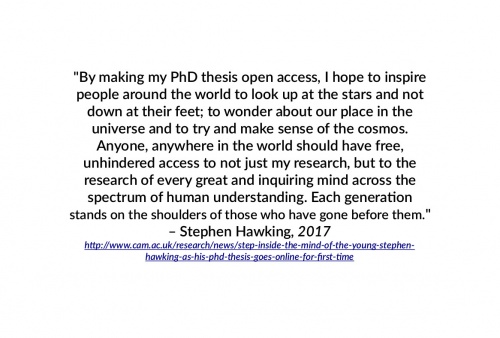](http://www.cam.ac.uk/research/news
/step-inside-the-mind-of-the-young-stephen-hawking-as-his-phd-thesis-goes-
online-for-first-time)
This made rounds last year.
As scholars, as authors, we have reasons to have our works freely accessible
by everyone.
We do it for feedback, for invites to lecture, for citations.
Sounds great.
So when after long two, three, four, five years I have my manuscript ready,
where will I go?
Will I go to an established publisher or an open access press?
Will I send it to MIT Press or Open Humanities Press?
Traditional publishers have better distribution, and they often have a strong
brand.
It’s often about career moves and bios, plans A’s and plan B’s.
There are no easy answers, but one can always be a little inventive.
In the end, one should not feel guilty for publishing with MIT Press.
But at the same time, one should neither feel guilty for scanning and sharing
such a book with others.
...
You know, there’s fighting, there are court cases.
[Aaaaarg](/Aaaaarg "Aaaaarg"), a digital library run by our dear friend [Sean
Dockray](/Sean_Dockray "Sean Dockray"), is facing a Canadian publisher.
Open Library is now facing the Authors Guild for lending scanned books
deaccessioned from libraries.
They need our help, our support.
But collisions of interests can be productive.
This is what our beloved _Cabinet_ magazine did when they found their PDFs
online.
They converted all their articles into HTML and put them online.
The most beautiful takedown request we have ever received.
[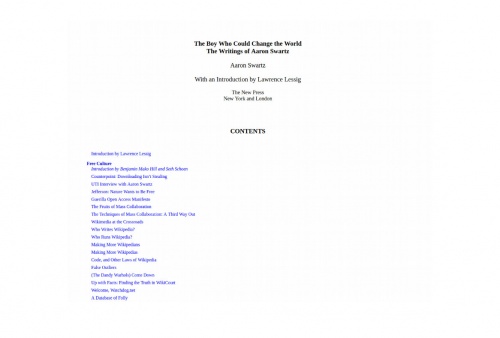](https://monoskop.org/log/?p=16598)
So what is at stake? What are these digital books?
They are poor versions of print books.
They come with no binding, no paper, no weight.
They come as PDFs, EPUBs, JPEGs in online readers, they come as HTML.
By the way, HTML is great, you can search it, copy, save it, it’s lightweight,
it’s supported by all browsers, footnotes too, you can adapt its layout
easily.
That’s completely fine for a researcher.
As a researcher, you just need source code:
you need plain text, page numbers, images, working footnotes, relevant data
and code.
_Data and code_ as well:
this is where online companions to print books come in,
you want to publish your research material,
your interviews, spreadsheets, software you made.
...
Here we distinguish between researchers and readers.
As _readers_ we will always build our beautiful libraries at home, and
elsewhere,
filled with books and... and external harddrives.
...
There may be _no contradiction_ between the existence of a print book in
stores and the existence of its free digital version.
So what we’ve been asking for is access, basic access. The access to culture
and knowledge for research, educational, noncommercial purposes. A low budget,
poor bandwidth access. Access to badly OCR’d ebooks with grainy images. Access
to culture and knowledge _light_.
Thank you.
Dusan Barok
_Written on 16-17 March 2018 in Athens and Amsterdam. Published online on 21
March 2018._